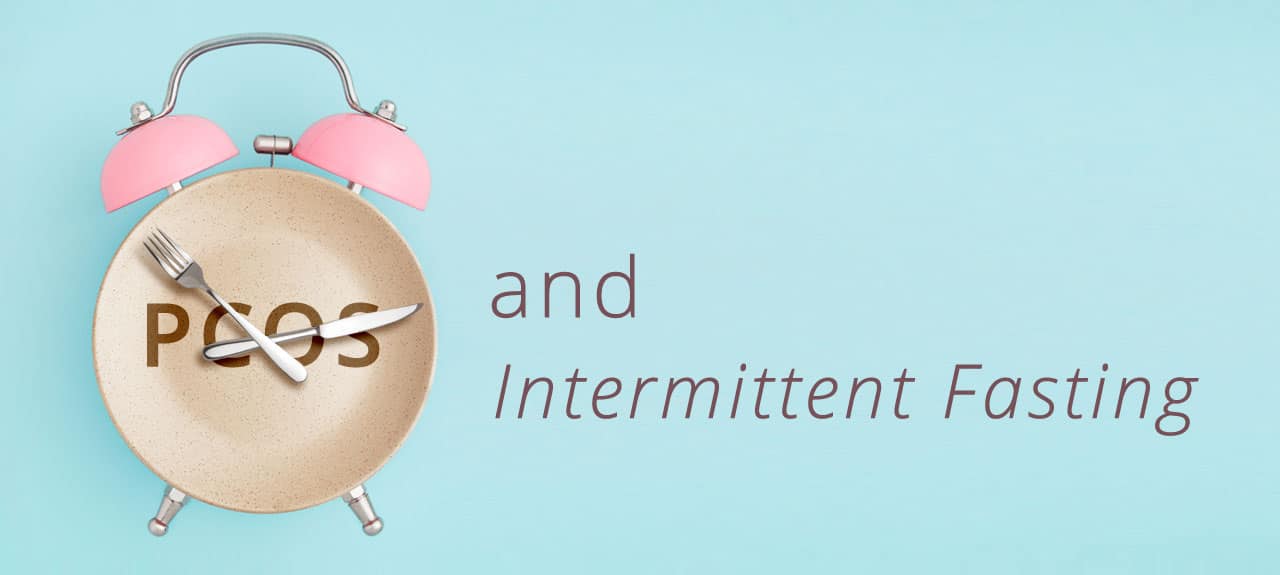Intermittent Fasting for PCOS
The phrase “intermittent fasting” seems to be popping up everywhere within the world of nutrition and weight loss lately. Interestingly, although intermittent fasting seems to be trending at the moment, it’s not a new concept. In fact, it has been used safely and effectively for many years, and in many cultures around the world.
The most popular use for intermittent fasting is weight loss. That said, considering the impact intermittent fasting has on insulin levels and inflammatory markers, it can be an effective treatment option in women with PCOS.
Intermittent fasting simply means going a prolonged period of time without consuming any food. There are many different ways to use intermittent fasting, depending on your medical history, weight loss goals, stress levels, and general vitality.
This type of fasting ranges from a 12-hour overnight fast and a 12-hour daily eating window, to several consecutive days and nights of complete fasting.

How does intermittent fasting work?
Research shows a whole host of potential benefits of intermittent fasting. These include weight loss, blood sugar regulation, inflammation reduction, lowered LDL cholesterol, and improved cognition.
Intermittent fasting’s impact on weight loss is primarily due to its insulin-lowering effects1. Insulin is a hormone that’s produced and released by the pancreas in response to a rise in blood sugar. Every time we digest and absorb our food, blood sugar levels rise and insulin levels rise in response.
How Does Insulin Work?
Insulin works by binding to receptors on the cells, which open up mini gates that allow blood sugar to flow out of the circulation and into the cells. As such, insulin is an anabolic hormone, meaning it’s involved in building and storing sugar in the cells. Whenever insulin is high, we’re in storage mode: pushing energy into our cells.
When someone does intermittent fasting, they’re putting their body through prolonged periods of time without eating, thus lowering blood sugar. If blood sugar levels are lower, insulin is lower as well. In contrast, if insulin is kept low, the body can move out of storage mode and into fat-burning mode!
There are a few other mechanisms that contribute to intermittent fasting’s role in weight loss. It can also increase growth hormone2 levels, reduce pro-inflammatory cytokines such as IL-6 and TNF alpha3. Additionally, it increases circulating norepinephrine, which may enhance the resting metabolic rate
How does intermittent fasting help in PCOS?

Intermittent fasting can be a great treatment for women with PCOS because of its insulin-lowering effect. We use intermittent fasting regularly to treat PCOS naturally in our Toronto clinic.
Elevated insulin levels are a major driver in many PCOS cases. Women with this condition often have higher insulin baseline levels and an exaggerated insulin response to food compared to healthy subjects.
This high insulin can lead to increased testosterone production by the ovaries. In turn, this can contribute to the acne, facial hair growth, and hair loss commonly seen in PCOS. High testosterone also impacts the ability to ovulate properly, and contributes to long menstrual cycles.
How Does Fasting Help?
By incorporating intermittent fasting along with other dietary and lifestyle changes, women with PCOS can reduce their fasting insulin levels dramatically. In turn, they can move away from this fat-storage mode and into fat-burning mode. If insulin can be brought down, women with PCOS should experience weight reduction, improved skin, and hair growth, as well as increased ovulatory cycles.
PCOS is also associated with increased inflammatory markers. Since intermittent fasting reduces inflammation within the body, this could be another huge benefit to this population.
Proper testing needs to be done to confirm whether insulin resistance is a part of your PCOS picture. A thorough explanation of insulin resistance testing can be found here.
Should intermittent fasting ever be avoided?
Although intermittent fasting can be very helpful for women with PCOS, it’s not for everyone. If you’re struggling with extreme stress and insomnia, for example, intermittent fasting may cause increased cortisol secretion and worsen these symptoms.
Additionally, if you have any history of an eating disorder, intermittent fasting isn’t right for you.
If intermittent fasting causes you to binge and overeat during the day, then it’s also not right for you.
Finally, it must be noted that more extreme fasting isn’t always better. One study found that prolonged fasting windows could be associated with increased risk of gallstone formation5.
Key Takeaways
- Intermittent fasting isn’t a diet, but rather a type of eating pattern, outlining when to eat and when to avoid food
- It has been shown to reduce insulin, increase growth hormone circulating levels, reduce pro-inflammatory markers, and increase circulating epinephrine
- This type of fasting can be an effective strategy in women with PCOS because it impacts insulin resistance and inflammation
- It’s not right for everyone, and should be avoided if you have a history of eating disorders, are going through extreme stress, and/or if it causes binge eating
References
- Sutton, E., Beyl, R., Early, K., Cefalu, W., Ravussin, E., & Peterson, C. (2018). Early Time-Restricted Feeding Improves Insulin Sensitivity, Blood Pressure, and Oxidative Stress Even without Weight Loss in Men with Prediabetes. Cell Metabolism, 27(6), 1212-1221.e3. doi: 10.1016/j.cmet.2018.04.010
- Hartman, M. (1992). Augmented growth hormone (GH) secretory burst frequency and amplitude mediate enhanced GH secretion during a two-day fast in normal men. Journal Of Clinical Endocrinology & Metabolism, 74(4), 757-765. doi: 10.1210/jc.74.4.757
- Faris, “., Kacimi, S., Al-Kurd, R., Fararjeh, M., Bustanji, Y., Mohammad, M., & Salem, M. (2012). Intermittent fasting during Ramadan attenuates proinflammatory cytokines and immune cells in healthy subjects. Nutrition Research, 32(12), 947-955. doi: 10.1016/j.nutres.2012.06.021
- Zauner, C., Schneeweiss, B., Kranz, A., Madl, C., Ratheiser, K., & Kramer, L. et al. (2000). Resting energy expenditure in short-term starvation is increased as a result of an increase in serum norepinephrine. The American Journal Of Clinical Nutrition, 71(6), 1511-1515. doi: 10.1093/ajcn/71.6.1511
- Sichieri, R., Everhart, J., & Roth, H. (1991). A prospective study of hospitalization with gallstone disease among women: role of dietary factors, fasting period, and dieting. American Journal Of Public Health, 81(7), 880-884. doi: 10.2105/ajph.81.7.880




